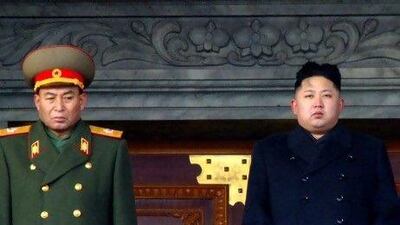BEIJING // North Korea's military chief has been relieved of his posts - a move seen by analysts as the country's new leader, Kim Jong-un, asserting his authority in the secretive communist state.
Officially, Ri Yong-ho stepped down because of illness but commentators said the development is more likely to be the result of power struggles that followed the death in December last year of the former leader, Kim Jong-il.
The resignation was reported by the country's state media yesterday. It comes just weeks after North Korea unveiled a series of economic reforms - and there have been other possible signs that the younger Mr Kim, thought to be in his late 20s, might introduce more reforms of the kind refused by his father.
It is just the beginning of generational changes "in key positions of the party, the military and the state for the Kim Jong-un era", said Paik Hak-soon, a senior fellow at South Korean think tank the Sejong Institute.
"Kim Jong-un must have wanted to replace Ri Yong-ho with his own man ... since Ri Yong-ho was his father's right-hand man."
Mr Ri, 69, was made head of the Korean People's Army in early 2009. In September the following year, he was given high-level Workers' Party of Korea appointments and made vice chairman of the powerful Central Military Commission, which Mr Kim now heads.
Trying to determine the significance of Mr Ri's apparent dismissal is difficult, given the secretive nature of the North Korean regime, said Park Young-ho, a fellow at the Korea Institute for National Unification in South Korea.
He said it was likely to represent "internal frictions among the top power elites" and could also suggest the Workers' Party was trying to gain precedence over the military. "By showing that even the top military leaders can be ousted," the relationship between the party and the North Korean military is re- established, Mr Park added.
Mr Kim came to power just over six months ago and some analysts say they detect signs he is open to reform.
An early indication came in January when Yang Hyong-sop, a senior parliamentary figure and member of the Workers' Party politburo, revealed that Mr Kim was studying economic reforms in other countries, including China.
Beijing has long tried to encourage Pyongyang to introduce economic reforms of the kind that have allowed China's economy to grow rapidly in the past three decades.
Under Kim Jong-il, however, reform was limited and the economy stagnant.
In April, the younger Mr Kim appointed several economic specialists to party positions. Last month, reforms of agricultural prices and a reduction in the size of cooperative farm units were announced.
"The is the strongest evidence that Kim Jong-un is introducing more reforms and opening the economic areas," Mr Paik said of last month's announcements.
Mr Kim has also adopted a more relaxed persona, speaking in public and being photographed with his tunic undone.
This month, the baby-faced leader, who was partly schooled in Switzerland, attended a performance featuring Disney characters - which is perhaps surprising in a country known for its verbal attacks on the United States.
"He has almost naturally shown a new style," said Mr Paik. "Why, is the question. [Because] he's a young man [and] he has experience studying and living in the West when he was young. His father did not live in the West."
In April, however, North Korea went ahead with a rocket launch that was viewed as a test for ballistic missile technology, although it ended in an explosion soon after take-off.
The country has yet to carry out a nuclear test, despite satellite images indicating preparations were under way.
Mr Paik said little immediate progress was likely in the country's fraught relationships with South Korea and the United States, with both gearing up for presidential elections this year.
It's thought that Park Geun-hye, the favourite to secure the South Korean presidency, would probably adopt a more conciliatory approach than the current president, Lee Myung-bak, who ended his predecessors' "sunshine policy" of engagement with Pyongyang when he took office.


